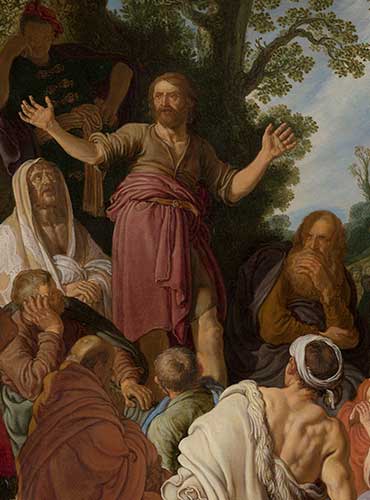Saturday of the Second Week of Advent – Mt 17:9a, 10-13
Today’s Gospel presents us with a scene that follows right after the Transfiguration, where Jesus appeared with both Moses and Elijah. The disciples then ask Christ about Elijah, and why he hadn’t come back yet. Christ replies that in fact he has, and the disciples get that Elijah refers to John the Baptist. Christ adds that He must suffer just like John did. So, what are we to take away from all this? First, let’s consider the nature of the question and the answer, and then what Christ remarks about His passion.
First, the disciples have asked a very good question. After all, there was a tradition that Elijah would return in order to prepare Israel for the coming of Messiah; Elijah didn’t die, but was taken up to heaven in a chariot of fire, so it was easy for everyone to expect his return. There were no concerns about the resurrection of the body and the like. So where does the confusion come in? In John’s Gospel, 1:21, the priests and Levites ask the Baptist directly, “‘What are you then? Are you Elijah?’ And he said, ‘I am not.’” So John says, “I am not Elijah.” Indeed, this is true: John the Baptist is not the same person as Elijah, or the reincarnation of Elijah; rather, as the Archangel Gabriel told Zechariah “He will go before him in the spirit and power of Elijah to turn the hearts of fathers toward children and the disobedient to the understanding of the righteous, to prepare a people fit for the Lord” (Lk 1:17). This was the anticipated mission of Elijah, and hence John fulfills that preparation.
What does this mean for us? On one hand, sometimes the gifts and graces we receive from God aren’t exactly the way we think they should look. Just as the disciples knew that Elijah needed to come back (that was an undisputable truth for them) but didn’t know how exactly or when or what that would look like, we know all the many truths of our faith: that God loves us, wants us to get to heaven, and permits only what is best for our eternal salvation. However, sometimes the manifestations of those truths are hard to accept: things like challenges, the sins of others or our own, and sufferings.
On the other hand, we’re reminded that, while holiness means union with God and His will, and that this doesn’t change, what holiness looks like here and now, for me in this moment in my vocation, is different than what it looks like for others. John the Baptist and Elijah were both holy men, because they both loved and served God, but what that holiness looked like was a little different. This, too, is part of why Christ mentions His passion and links it to John’s suffering, our second point. Commenting on this passage, Saint Thomas Aquinas points out a number of similarities between the Baptist and Christ, ways in which John was the precursor of Christ: in birth, John was born of a sterile woman, Christ of a Virgin, in preaching, since John preached penance and conversion, as did Christ, and lastly even in the Passion: while John was condemned by Herod and Jesus by the scribes and Pharisees, Aquinas notes that Herod agreed with Jesus’ death and the scribes with John’s. Commenting on this, Saint John Chrysostom says that the anticipation of His Passion was meant to comfort the disciples, and it should also comfort us, because we know that we too must suffer in imitation of Christ. Just as with holiness, we don’t know in particular what that might entail, but we know that sufferings and persecutions will inevitably follow the Cross.
Today, as we reach about the halfway point on our Advent journey, let’s think about how we are striving to live our holiness in our lives, and how well we try to be holy by living out our vocations. We ask for the grace of holiness through the intercession of Mary, Mother of God, and Saint John the Baptist.






